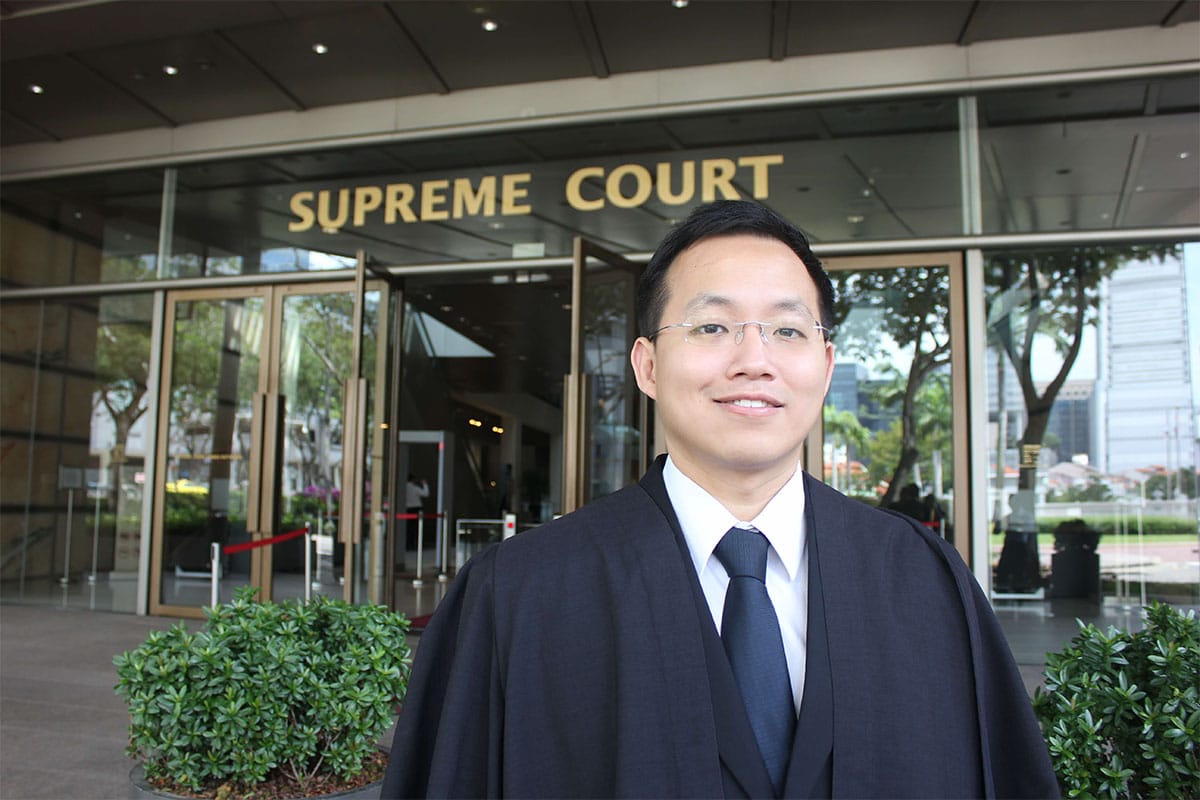
Dbs’ Joey Pang On Why ‘Risk-Averse’ Isn’t Always Good
Plus, why he’s calling on other in-house counsel to become accredited as specialists in data and digital economy law.
BY ASHUTOSH RAVIKRISHNAN
Very little about Mr Joey Pang’s career seems deliberate and calculated. In fact, midway through our conversation, his son darts into his home office. “That was unexpected,” he smiles a few moments later, as he locks the door behind him. In some ways, the incident reflects Mr Pang’s career, which has taken many unexpected turns. As he puts it, “I took the scenic route to legal practice.”
That route started in the late 1990s during the dot-com boom, when Mr Pang started a software development company with friends from polytechnic. Although he made a comfortable living, it was nothing to shout about. After that, he joined the Ministry of Defence, serving in its intelligence branch. “Very interesting and engaging work,” he recalls. But he realised that at its core, it did not allow him to problem solve, which he was hankering to get into.
When looking for roles within the private sector, he heard about the Singapore Management University’s then-nascent Juris Doctor programme and on a whim, decided to apply. Explaining his decision, he says, “There was a bit of unrequited love with law school. At that time, getting into law school from polytechnic was close to impossible, so I was grateful for an opportunity to finally read law.” His decision was validated when he received a scholarship from the university. After a short stint at Rajah & Tann, he received yet another scholarship—the prestigious Chevening, no less—to finish an LLM at the London School of Economics.
THE DOOR TO DBS
That brings us to an interesting point in his career: shortly after returning to practice, he got a call out of the blue, asking if he was interested in an in-house position. Such calls are common for many practitioners and Mr Pang reveals that his usual refrain was, “I’m too busy, sorry.” “And I really did believe that, because I felt that I owed it to my firm to stay, because they were nothing short of fantastic, holding my place for a year while I went off to study some more.” But the person on the other end of the line was persistent. “They were looking for someone interested in improving practice from a future law perspective,” he recalls.
His interest piqued, he agreed to a meeting with Mr Jeffery Lee and the two hit it off. “People think that we’ve known each other for a long time, which is actually not true at all. It was a ‘right person, right time’ kind of conversation. But even then, I did think long and hard before accepting the contract, because of some sense of loyalty to the firm.”
When recalling the experiences that he cherished, Mr Pang thought about a five-month secondment to another major bank in Singapore. Using his tech background, he wrote a simple script that could generate forms with a few data inputs. “It made me wonder how many more of these low-hanging fruit there were in practice.” And beyond those, it also opened up the possibility of what legal departments could do if they reimagined their value. “Nothing was stopping them from running tech projects to help them do their work better. But there was just not much enthusiasm to get those projects off the ground, maybe because they didn’t know how to.”
Or maybe because they didn’t have the headspace to even think about these issues. “You can’t be expected to meet a billion targets and also run two digital projects at the same time, right? I talked about this to Rajesh (Sreenivasan) and he admitted that you do make sacrifices, in terms of your billing and ability to commit time to practice. But I think Rajah & Tann is fortunate to have him do this and take one for the team, because in the bigger scheme of things, his contributions are invaluable.”

Sharing a lighthearted moment with his son.
LOOKING AT RISK DIFFERENTLY
Being a later-career lawyer has allowed Mr Pang to identify some of the pitfalls of the profession. One of the biggest, he says, is its natural aversion to risk—something he tries to combat in his current position as Senior Vice-President (Legal & Compliance) at DBS. “I try to instil in my team an eyes wide open approach to risk: to recognise that risk exists, but to realise it’s not something to be avoided at all costs. I think being overly conservative with risk may mean you provide very safe counsel, even if it’s not the wisest. Overcoming this innate aversion can make lawyers more commercial and valuable, be it in-house or in practice.”
A breed of lawyers comfortable with risk won’t be Mr Pang’s only legacy. He will also help shape digital lawyers through his steering of SAL’s accreditation of specialists in Data and Digital Economy (D2E) Law. This will be the first accreditation track open to in-house counsel, a significance that’s not lost on Mr Pang, who was on the subcommittee that conceptualised the accreditation.
“Accrediting D2E was never going to be easy, because it’s such a fast-changing area. So we hope to identify some of the key areas and principles that will be relevant even as new technologies manifest these issues differently.”
“In-house counsel are forging new paths in areas where the laws are just taking shape and I’m glad the accreditation recognises that. Countless of my peers in areas like NFTs and cryptocurrencies are looking at the law creatively to buy them the assurance of legal enforceability or commercial protection. So this recognition of the cutting-edge legal work they do is timely.”
The recognition that the accreditation confers will also benefit employers, especially those with nascent legal teams. “Having your first in-house hire be an accredited specialist means you can get more quality people to join your legal team,” reflects Mr Pang.
Joey runs a module on digital asset management and protection; and fintech and regtech regulation as part of SAL’s Data and Digital Economy Law Course for Legal and Industry Practitioners. Find out more and register here.

